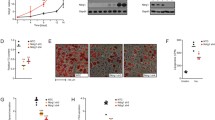Abstract.
Members of the signal transducer and activator of transcription (STAT) family and the mitogen-activated protein kinase (MAPK) cascade play a major role in the regulation of cell growth and differentiation. This review concentrates on the role played by these pathways in the development of adipose cells. STATs are activated by both positive and negative modulators of adipocyte differentiation leading to the hypothesis that the STAT pathway may function in adipogenesis. The role of the p42/p44 MAPK pathway in adipocyte differentiation has recently been the subject of contradictory reports. Several molecular mechanisms are proposed to explain the opposing effects of MAPK activation in the programme of adipose cell differentiation.
Similar content being viewed by others
Author information
Authors and Affiliations
Additional information
Received 21 May 1999; accepted 29 June 1999
Rights and permissions
About this article
Cite this article
Aubert, J., Belmonte, N. & Dani, C. Role of pathways for signal transducers and activators of transcription, and mitogen-activated protein kinase in adipocyte differentiation . CMLS, Cell. Mol. Life Sci. 56, 538–542 (1999). https://doi.org/10.1007/s000180050450
Issue Date:
DOI: https://doi.org/10.1007/s000180050450




